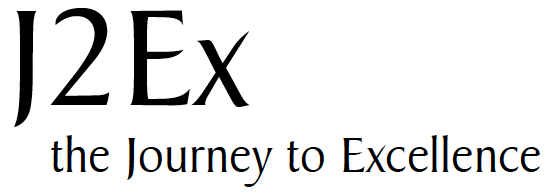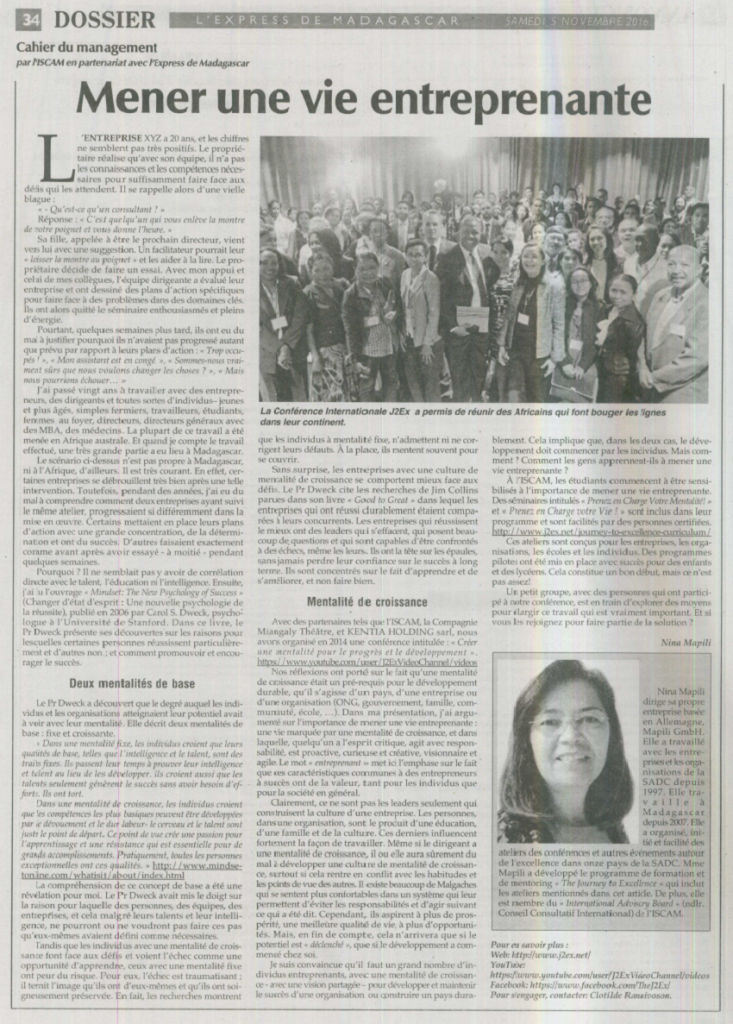Lead an enterprising life!
“Lead an Enterprising Life!”, an article by Journey to Excellence program developer Nina Mapili, recently appeared in the “Cahier de Management, Express de Madagascar” as part of a series by leading Malagasy business school ISCAM. The article picks up the thread of the 2014 international conference “Creating a Mindset for Growth and Development” that her company, Mapili GmbH, organized with Malagasy partners ISCAM, “Compagnie Miangaly Théâtre” and KENTIA Holding sarl.
In the article, she argues that it takes a critical mass of enterprising, growth mindset individuals – with a shared vision – to develop and maintain a successful organisation – or a sustainable country – and emphasizes the value of leading an “enterprising life”.
Lead an Enterprising Life!
Company XYZ is 20 years old, and the numbers are not looking good. The owner realized that he and his team didn’t have the necessary knowledge and skills to sufficiently address their challenges, but he’d also remembered the old joke:
“What is a consultant?”
“Someone who takes the watch off your wrist and tells you the time.”
When his daughter – the next MD, so he hoped – came up with a suggestion whereby a facilitator would “leave the watch on their wrist” and help them read it, he decided to give it a try. With support from me and my colleagues, the management team assessed their company and crafted specific action plans to address key problem areas. They left the workshop excited and energized.
A few weeks later, though, they were having a hard time rationalizing why they hadn’t made much progress on their action plans: ‘Too busy!’, ‘My assistant is on holiday.’, ‘Are we really sure we really want to change things?’, ‘But we might fail…’
I’ve spent 20 years working with entrepreneurs, managers, and assorted individuals – young and old, simple farmers, workers, students, housewives, managers, CEOs with MBAs, medical doctors. Most of this work has been in southern Africa. Much of it, especially when counting work done by facilitators I’ve trained, has been in Madagascar.
Though the above scenario is not unique to Madagascar, or Africa for that matter, it is common. Yes, some companies do very well following such an intervention. For years, though, I struggled to understand how two companies could go through the same type of workshop and progress so differently when it came to implementation. Some worked through their action plans with great focus, determination, and ultimately success, while others just went back to “business as usual”, perhaps after a couple of weeks of half-hearted attempts.
Why? There didn’t seem to be a close correlation with talent, education or intelligence. Concepts such as “learning organisation” and “company culture” had something to do with it, but didn’t really cut to the core. Then I read “Mindset: The New Psychology of Success”, published in 2006 by Stanford University psychologist Carol S. Dweck. In her book, Prof. Dweck outlines her findings from decades of research into why specific people succeed and others don’t, and how to promote or foster success.
Prof. Dweck discovered that the degree to which people and organisations achieve their potential correlates with their mindset. She describes two basic types of mindset: fixed and growth.
“In a fixed mindset, people believe their basic qualities, like their intelligence or talent, are simply fixed traits. They spend their time documenting their intelligence or talent instead of developing them. They also believe that talent alone creates success—without effort. They’re wrong.
In a growth mindset, people believe that their most basic abilities can be developed through dedication and hard work—brains and talent are just the starting point. This view creates a love of learning and a resilience that is essential for great accomplishment. Virtually all great people have had these qualities.”
http://www.mindsetonline.com/whatisit/about/index.html
Understanding this basic concept was a lightbulb moment for me! Prof. Dweck had put her finger on why some people, teams, companies – despite all their talent and intelligence – just couldn’t, or wouldn’t, take those steps they themselves had deemed necessary. Through the facilitated step-by-step process, the XYZ team had come up with good goals, strategies and plans. Back in the office, the horror hit them: “We could fail!”
Whereas people with a growth mindset embrace challenges, and see failure as an opportunity to learn, people with a fixed mindset are risk averse. For them, failure is very traumatic; it tarnishes their carefully preserved self-image. In fact, research shows that people with a fixed mindset neither admit, nor correct their deficiencies. Instead, they often lie to cover them up. In business, the fixed mindset desire to be seen as perfect is so widespread that it has a name: the “CEO disease”. But it is not limited to CEOs.
Unsurprisingly, companies with a growth mindset culture weather challenges best. Prof. Dweck sites research by Jim Collins from his book “Good to Great” in which sustainably successful companies were compared to their competition. The most outstanding difference was their leadership. The highly successful companies had self-effacing leaders who asked lots of questions and were able to confront the sometimes brutal truth of failure – even their own – head on, while not losing confidence in their longer term success. In other words, these leaders had growth mindsets. They were focused on learning and improving, not on being right.
My company, together with partners ISCAM, Company Miangaly Théâtre and KENTIA HOLDING sarl, organised a conference in 2014 entitled “Creating a Mindset for Growth and Development”. https://www.youtube.com/user/J2ExVideoChannel/videos Our premise was that a growth mindset, through its support for the achievement of personal and organisational potential, is a prerequisite for sustainable development – be it in a country, company or other organisation (NGO, government, family, community, school…). In my opening presentation, I argued the value of leading an “enterprising life” – a life hallmarked by a growth mindset, and in which one thinks critically, acts responsibly, is pro-active, curious and creative, visionary, agile. The word “enterprising” is used not to say that everyone must become an entrepreneur and start a business, but rather to emphasize that those characteristics common to successful entrepreneurs are valuable to people and society in general.
Why is this important from an organisational standpoint? One of the exercises my colleagues and I like to do with businesses or other organisations is “The way it is vs. The way it should be”. In the first part of the exercise, teams of 5 or 6 people use their bodies and sounds to illustrate what their organisation would be like if it were a machine. In the second part, they illustrate the way the machine should be working. Instead of creating, for example, a machine that has many different parts, each doing its thing with varying degrees of coordination and noise relative to other parts, we have observed a different solution common in Madagascar. Here, teams choose to be some type of vehicle – plane, bus, train. In version one, the ride is bumpy. In version two – the way it should be – the ride is smooth. Common to both is that one person is up front steering, and the rest sit back passively, just along for the ride.
This “one genius and a lot of hands” approach is a reflection of a fixed mindset. Imagine the increased potential if those passive hands were instead responsible, proactive, creative, agile people working toward a shared vision!
Clearly, though, it is not only the leader who shapes company culture. The people in an organisation are the product of their education, family, and culture. All of these strongly influence the way they do their work. Even if a leader has a growth mindset, s/he will be mightily challenged when trying to develop a growth mindset culture if it conflicts with people’s longstanding habits and views of themselves in the world. Many Malagasy people seem most comfortable in a system that allows them to avoid responsibility and passively do as they’re told. At the same time, they wish for more prosperity, a better quality of life, more opportunities for themselves and their children, and at least some of those aspirational things they see on billboards, in magazines or on TV. Ultimately, this isn’t going to happen unless their potential is “unleashed”, unless development is home-grown.
I’m convinced that it takes a critical mass of enterprising, growth mindset individuals – with a shared vision – to develop and maintain a successful organisation – or a sustainable country. The implication is that in both cases development must start with the individual. But how? How do people learn to lead an enterprising life?
At ISCAM, students are introduced to the importance of leading an enterprising life through my “Take Charge of Your Mindset!” and “Take Charge of Your Life!” programs, which have been incorporated into their curriculum. http://www.j2ex.net/journey-to-excellence-curriculum/ Licensed facilitators offer workshops tailored for businesses, organisations, schools and individuals. Very successful pilot programs have been carried out with pre-schoolers and high school students. That is all very good, but it isn’t enough!
A small group, with people from the conference partners at its core, is exploring ways to expand the reach of this important work. Why don’t you join them, and become part of the solution?
To learn more:
Website: http://www.j2ex.net/
YouTube: https://www.youtube.com/user/J2ExVideoChannel/videos
Facebook: https://www.facebook.com/TheJ2Ex/



